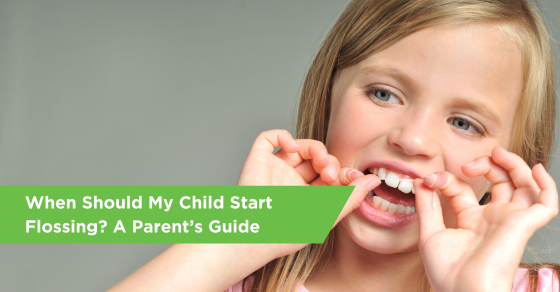When Should My Child Start Flossing? A Parent’s Guide
- November 22nd, 2023
- Childrens Dental Tips

As a parent, you’re keenly aware of the importance of instilling good oral hygiene habits in your child from an early age. You’ve diligently taught them to brush their teeth regularly, but now you may be wondering when it’s time to introduce another crucial step in oral care: flossing.
As a parent, you’re keenly aware of the importance of instilling good oral hygiene habits in your child from an early age. You’ve diligently taught them to brush their teeth regularly, but now you may be wondering when it’s time to introduce another crucial step in oral care: flossing. Flossing plays a vital role in maintaining healthy gums and teeth, and knowing when to start is key to your child’s overall dental health. In this comprehensive guide, we’ll explore the right time to introduce flossing to your child, the benefits of early flossing, and provide helpful tips to make it a positive and effective part of their daily routine.
The Significance of Flossing:
Before we dive into when to start flossing, let’s understand why flossing is such an essential part of oral hygiene. Flossing serves several critical functions in maintaining healthy teeth and gums:
1. Plaque and Food Particle Removal:
Flossing helps remove plaque buildup and food particles from between teeth and along the gumline. These areas are often inaccessible with a toothbrush alone.
2. Gum Health:
Flossing helps prevent gum disease by removing the debris that can lead to inflammation and infection.
3. Cavity Prevention:
By eliminating plaque and food particles, flossing reduces the risk of cavities between teeth.
4. Fresh Breath:
Flossing helps remove trapped food that can contribute to bad breath.
When to Start Flossing
The right age to start flossing your child’s teeth is a common question among parents. The American Dental Association (ADA) and most pediatric dentists recommend introducing flossing when your child has two teeth that touch, typically around the age of 2 to 3. At this stage, your child’s primary teeth, also known as baby teeth, are in place.
However, it’s important to note that while you can introduce the concept of flossing at this age, it may take some time for your child to develop the manual dexterity and patience required for effective flossing. Therefore, the initial focus should be on making flossing a familiar activity rather than expecting thorough flossing.
Around Age 2 to 3:
– Introduce Flossing:
Begin introducing flossing as part of your child’s daily oral hygiene routine. Use this time to make flossing a comfortable and non-threatening experience. Consider using a floss holder or floss pick designed for children, as these can be easier for little hands to manage.
– Demonstrate the Technique:
Show your child how to use the floss by gently guiding it between their teeth. Emphasize the importance of being gentle to avoid harming their gums.
– Keep It Fun:
Make flossing a fun and interactive experience. You can use stories, songs, or a reward chart to encourage their participation. Colorful floss can also add an element of excitement.
– Supervise Closely:
Initially, closely supervise your child’s flossing routine to ensure they are using proper technique and not swallowing the floss. Safety is paramount.
Around Age 6 to 7:
As your child’s permanent teeth start coming in, usually around the age of 6 or 7, it’s time to shift the focus to more regular and independent flossing. The spaces between permanent teeth are tighter, making flossing even more crucial for maintaining oral health.
Tips for Introducing and Encouraging Flossing
Introducing flossing to your child is a significant milestone in their oral health journey. To ensure it’s a positive and effective experience, consider these tips:
Lead by Example:
Children learn by imitation. Make sure your child sees you flossing regularly. When they witness you flossing, they are more likely to perceive it as a normal and essential part of daily hygiene.
Choose the Right Tools:
Select floss that is soft, flexible, and designed for children. Some floss products come in fun colors or flavors, which can make the experience more enjoyable for kids.
Make It Fun:
Turn flossing into a fun activity. Sing a flossing song, create a reward chart, or use playful language to make it exciting. The more enjoyable you make it, the more likely your child will be to embrace the habit.
Supervise Initially:
Even as your child becomes more independent with flossing, it’s crucial to supervise their efforts in the beginning. This ensures they are flossing correctly and not causing any harm to their gums or teeth.
Be Patient and Supportive:
Flossing can be a challenging task for young children. Be patient and provide gentle guidance. Avoid scolding or showing frustration if they find it difficult initially.
Praise and Positive Reinforcement:
Offer praise and positive reinforcement when your child flosses correctly. A simple “great job” or a small reward can go a long way in motivating them to continue the practice.
Teach Proper Technique:
Ensure your child understands the correct technique for flossing. Show them how to gently guide the floss between their teeth, forming a C-shape around each tooth to remove debris and plaque.
Establish a Routine:
Make flossing a regular part of your child’s oral hygiene routine. Consistency is key to developing good habits.
Use Child-Friendly Resources:
Consider using educational books, videos, or apps designed for children that explain the importance of flossing and make it more relatable.
Final Thoughts
Introducing flossing to your child at the right time and in a positive way is a crucial step in maintaining their oral health. Starting early and making flossing a regular part of their routine can set them on the path to a lifetime of healthy gums and teeth. Remember that your dentist can also provide guidance on when and how to incorporate flossing into your child’s oral care regimen. With your guidance and support, your child can develop excellent oral hygiene habits that will serve them well throughout their life.
In conclusion, while the age at which your child should start flossing may vary, the importance of this habit cannot be overstated. Flossing is a simple yet effective way to maintain oral health, prevent dental issues, and ensure your child enjoys a lifetime of beautiful smiles. So, start early, make it fun, and watch your child embrace flossing as a natural part of their daily routine.
Reach Out to Our Kids-Only Dentist TodayAre you searching for a friendly and experienced children’s dentist to help your child maintain a healthy smile early on? Luckily, our kids-only dentist in Kitchener and team are always welcoming new patients with no referral necessary. To book an appointment, call SmileTown – Just Kid’s Dentistry at (226) 773-1663, or contact us here.

